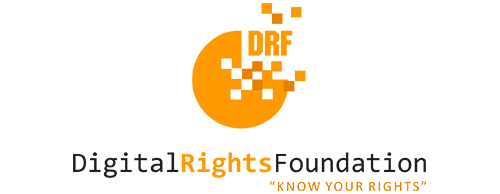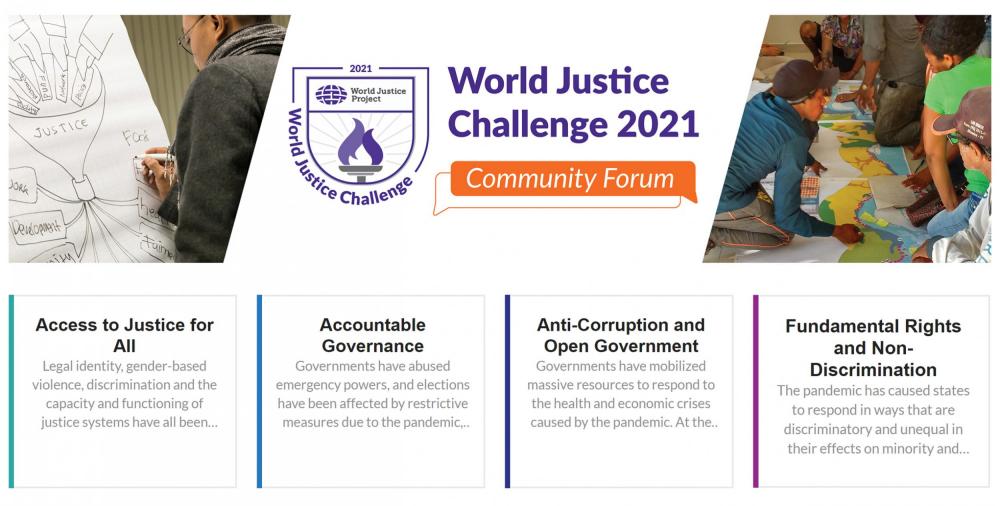Project Pitch and Q&A
Watch Digital Rights Foundation's World Justice Challenge project pitch and join WJP's World Justice Challenge 2021 Community Forum to ask questions to project representatives, explore additional resources, meet new colleagues, and more. Join the discussion and help us build stronger rule of law values, institutions, and communities around the world.
Ask your question at the Community Forum
Project Summary
The project seeks to address gender-based violence in online spaces within Pakistan through a holistic approach by providing services in the form of the cyber harassment helpline and consciousness building regarding this emerging form of violence in the country. Online violence often remains unaddressed by many organizations given the specific and tech-based expertise it requires. This project seeks to address online violence through a gender-based, preventative, and mitigation approach, building on the existing work that the Digital Rights Foundation has done through its helpline.
Problem Statement
As internet connectivity in Pakistan has increased multifold, so have instances of harassment and violence on online platforms, particularly directed toward women and gender minorities. The number of reports for cybercrime with law enforcement agencies has risen: according to the FIA, since 2016, it has received over 42,447 cyber harassment complaints, with 9,625 inquiries, registered 936 cases, and made 904 arrests. As per DRF's survey of young women in the country, 34% of women had experienced online harassment, while 55% reported that they had witnessed other women being harassed. Furthermore, 70% of women stated that they were afraid of posting their pictures online due to the risk of misuse. In the backdrop of the unprecedented Coronavirus pandemic and the lockdown initiated in response to the COVID-19 outbreak, there is a need to address the emerging threats and challenges as a direct and indirect result of the medical, economic, and social emergency being faced both worldwide and locally. As people are spending more time online, there has been a considerable increase in the number of cases of online harassment, abuse, and violence. The total number of cases received by the Helpline through its digital channels has increased since the COVID-19 lockdown; this can be seen through an exponential 145% increase in cases from January and February to March 2020. There has been a 500% increase in cases relating to online defamation from February to March; a 1200% increase in hate speech cases; a 500% increase in cases of non-consensual use of information; and a 200% increase in blackmailing cases. Furthermore, many women have experienced barriers in reporting cases to the LEAs given social distancing, lockdown orders, and scaling back of resources for addressing violence against women.
Project Description
This project seeks to provide assistance to survivors and victims of online gender-based violence in Pakistan, a majority of whom are women, young girls, and gender minorities. The Cyber Harassment Helpline was founded in December 2016 to provide assistance and support to victims of online harassment through its toll-free number from 9 AM to 5 PM, five days a week. The Helpline was the region's first dedicated one, dealing with online harassment with the aim of providing confidential, safe, and gender-sensitive services to women, sexual minorities, human rights defenders, journalists, and ethnic/religious groups. In the three years of its operations, the Cyber Harassment Helpline has been at the forefront of issues relating to online harassment. From December 2016 to November 2019, the Helpline received 4,492 individual complaints.
Through this project, we seek to sustain our helpline to provide support through our three core services: 1) Digital security support; 2) Legal advice; and 3) Psychological assistance. The Helpline Support Team, through a qualified psychologist, digital security expert, and a lawyer, will provide specialized assistance when needed. Our Call Support Officers will be all women with specialized training in dealing with harassment cases in a gender-sensitive manner. Digital security support will be provided by our in-house Digital Security Experts to help complainants in removing online content, securing accounts, and strengthening privacy settings. Legal advice and referral will be provided by the Legal Officer, who assists with registration of cases at the Cyber Crime Wing at the FIA, following up on registered cases on behalf of complainants and pursuing legal action. Lastly, psychological assistance is provided by the in-house Psychologist who deals with the emotional trauma that comes with harassment. These services are supplemented by a referral network with government and non-governmental organizations. Furthermore, DRF's online portal for pro bono lawyers and practitioners, "Ab Aur Nahin," is also connected to the Helpline and aims to provide free legal services for women who want to pursue cases of harassment through a comprehensive directory of lawyers around the country to provide support and assistance.
Since the COVID-19 pandemic, the Cyber Harassment Helpline experienced an overwhelming surge of cases relating to online gender-based violence. With this inundation of cases, the Helpline had to balance the health and safety of its staff. This project will help with sustaining this work and enhancing our ability to deal with the increased cases during the pandemic.
Project Impact and Potential for Scaling, Replication, and Sustainability
The impact of the helpline is measured in both qualitative and quantitative terms. The number of calls and nature of cases is measured through the annual reports published by the cyber harassment helpline. The latest report is available here.
These reports highlight the number of calls as well as the seriousness of the cases dealt with. The volume of calls and impact during the COVID-19 pandemic was highlighted through a policy brief published by the helpline. In the last four years, the cyber harassment helpline has dealt with an upwards of 7,000 cases of online violence, harassment, and crime. The volume of cases in the last four years has steadily increased, and the resources at the helpline require scaling up to deal with this demand.
The project will be geared toward sustainability and scaling of the helpline in the future. The basic infrastructure of the cyber harassment helpline is in place in terms of equipment, policies, protocols, and referral network; however, given that the helpline does not follow a profit-model to maintain independence and thus keeping its services free, sustainability is a big challenge. The project funds will partly be geared towards sustaining the services of the helpline, while at the same time introducing innovative solutions to evolve the services in line with the needs of its callers. The measures taken during the COVID-19 pandemic were only supported by funders for three months, during which the helpline gained immense experience in dealing with cases of online violence. This project seeks to take these learnings on how to address online violence from a legal, technological, and mental health perspective. Furthermore, given that the helpline has more experience in working remotely and through virtual channels, the project also seeks to scale up its work to address cases of violence and harassment from across South Asia by building a regional referral network that allows for resources to be pooled together to address online violence at a larger scale. This is important for two reasons: a) many resources can be shared across organizations regardless of location (DRF can share its awareness/educational material and offer content takedown services for harmful content across borders); and b) given the transnational nature of cyber violence, it is important to develop these networks for cases with overlapping jurisdictions.
Key Project Links
Social Media: Facebook, Twitter, YouTube, Instagram, TikTok
Website: digitalrightsfoundation.pk
Submit Your Questions and Get Ready to Pick a Winner!
Representatives of World Justice Challenge 2021 finalist projects are on hand to answer your questions. Join our online Community Forum to engage with finalists, share resources, and network with other members of the rule of law community. Submit your questions now and get ready to vote for your favorite project—voting opens in mid-April!
Join the Conversation

